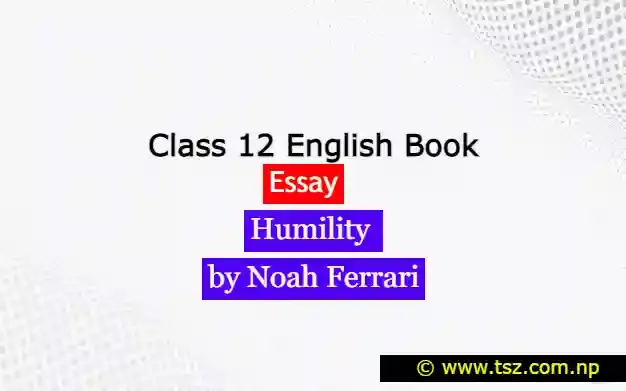Summary of Humility by Yuval Noah Harari Class 12 English
Humility Summary by Yuval Noah Harari class 12 English is here. For complete notes of Class 12 English Book, go to this link - Class 12 English Guide & Notes.
Humility Meaning = State of being Humble
Main Summary
In the essay, Humility, Yuval Noah Harari exemplifies the virtue of humility in that he debunks humanity’s illusions of superiority and mastery. He claims morality, art, spirituality and creativity are universal human abilities embedded in our DNA.
Yuval Yuval Noah Harari, a well-known Jerusalem writer, is the author of the essay Humility. According to him, we are born with the ability to be moral, artistic, intellectual, and creative. He demonstrates the virtue of humility by demolishing human illusions of supremacy and dominance over the natural world
As a general rule, most individuals feel that they are the centre of the universe and that their culture is the foundation of human evolution. Most people don't have the ability to be humble, says Harari, and that's something we should work on. Humbleness is shown in this article by the author's criticism of humanity's false sense of superiority and control over its technological and social environment.
There is a strong belief among Chinese patriots that many outstanding ideas were born in China. There are some Indians who think that aircraft and nuclear weapons were developed long before Confucius or Plato. It is widely held in Greece that the beginning of history was marked by the writings of Homer, Euripides, Aristotle, and Plato. In the eyes of Jews, monotheism belongs to them and they are one of the world's most important religious groups. In the eyes of the Jewish people, the gentiles (non-jewish people) are inferior to them since they don't consider themselves to be part of God's chosen peoples.
The fact that there are only 15 million Jews doesn't make them more significant than the Hindu faith, which has many more adherents.
Similarly, the religion of Islam now regards all history previous to Mohammed to be unimportant.
Each group considers itself to be the centre of the universe, as well as the originator of the most significant ideas and innovations. No group is truly unique. Before them, there was at least one group that had the same ideas and beliefs as them. The religions that have lasted are the ones that were the most violent. They were able to get the most people to believe in them. One should not feel proud of inventing monotheism since it has led to the destruction of the planet.
Religious tolerance has been advocated by certain wise men and women, but the general tendency has always been to condemn individuals with differing religious views. Ironically, most faiths warn against this kind of selfishness.
Go to:Exercise of Humility by Yuval Noah Harari
Humility : Glossary
linchpin (n.): the most important thing
retort (v.): make a quick reply to an accusation or a challenge
barbarous (adj.): cruel or wild
spectacular (adj.): impressive
disintegrate (v.): to break or cause sth to break into small parts or pieces
embedded (v.): to fix sth deeply and firmly in a mass of sth
genesis (n.): origin of sth
egotism (n.): the practice of thinking and talking too often or too much about oneself
concubines (n.): (in countries a man can legally have more than one wife) a woman who lives with a man, often as well as his wife or wives, but with lower status
fringe (n.): the front part of sb’s hair, cut so that it hangs over the forehead
annihilated (v.): to destroy sb/sth completely
grandiose (adj.): more elaborate than necessary
chutzpah (n.): extreme self-confidence, audacity
ludicrous (adj.): ridiculous, absurd
Who is Humility essay writer, Yuval Noah Harari?
Prof. Yuval Noah Harari is a historian, philosopher, and the bestselling author of Sapiens: A Brief History of Humankind, Homo Deus: A Brief History of Tomorrow, 21 Lessons for the 21st Century, and Sapiens: A Graphic History. He is a Co-founder of Sapienship, a multidisciplinary organization advocating for global responsibility whose mission is to clarify the public conversation, support the quest for solutions and focus attention on the most important challenges facing the world today. He is now a lecturer in the Department of History at the Hebrew University of Jerusalem.
